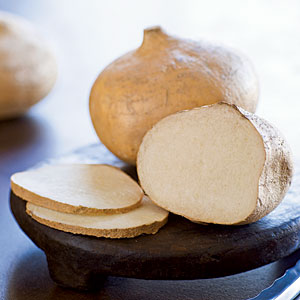Jicama
From Wikiwel
Other Names : Pachyrhizus erosus, yam bean, Mexican water chestnut, Mexican turnip, sengkwang,
Scientific name: Pachyrhizus erosus.
Jicama is a round, fleshy taproot vegetable of bean family plant. Its underground starchy root is one of the popular edible root vegetable grown in many parts of Central American, South Asian, Caribbean, and some Andean South American regions. Its refreshing, crispy, ice-white fruit-like pulp is eaten raw or cooked in a variety of sweet and savory dishes worldwide.
Special Precautions of Jicama
- Jicama plant contains significant levels of fat-soluble organic toxin, rotenone. It is concentrated especially in the leaf tops, stems and seed pods and at much lower levels in the roots. Several studies found that it is linked to the development of Parkinson's disease. However, peeled roots are safe for human consumption, including in children. Rotenone works at cellular level inhibiting several metabolic enzymes like NADH dehydrogenase in the mitochondria. Outside, it is used as environmentally safe broad-spectrum insecticide, piscicide (to poison fish), and pesticide.
- Not to confuse with yacón
The benefits of Jicama are
- very low calorie root vegetables; contains only 35 calories per 100 g. However, its high quality phyto-nutrition profile comprises of dietary fiber, and anti-oxidants, in addition to small proportions of minerals, and vitamins.
- It is one of the finest source dietary fiber and excellent source of oligofructose inulin, a soluble dietary fiber. The root pulp provides 4.9 mg or 13% of fiber. Inulin is a zero calorie, sweet inert carbohydrate and does not metabolize in the human body, which make the root an ideal sweet snack for diabetics and dieters.
- As in turnips, fresh yam bean tubers are rich in vitamin C; provide about 20.2 mg or 34% of DRA of vitamin C per 100 g. Vitamin-C is a powerful water-soluble anti-oxidant that helps body scavenge harmful free radicals, thereby offers protection from cancers, inflammation and viral cough and cold.
- It also contains small levels of some of valuable B-complex group of vitamins such as folates, riboflavin, pyridoxine, pantothenic acid and thiamin.
- It provides healthy amounts of some important minerals like magnesium, copper, iron and manganese.
- Source of Inulin
